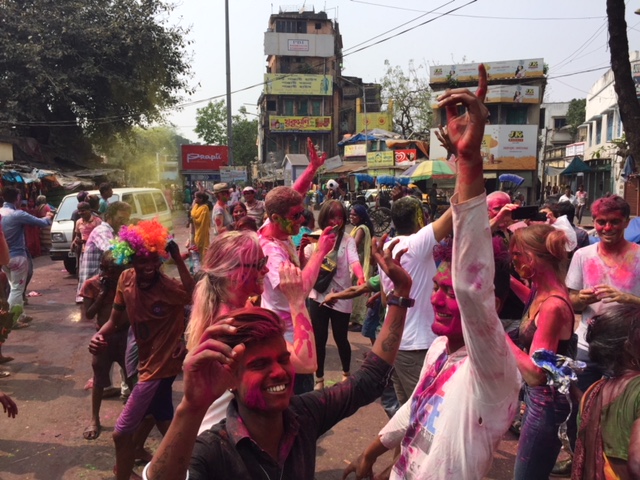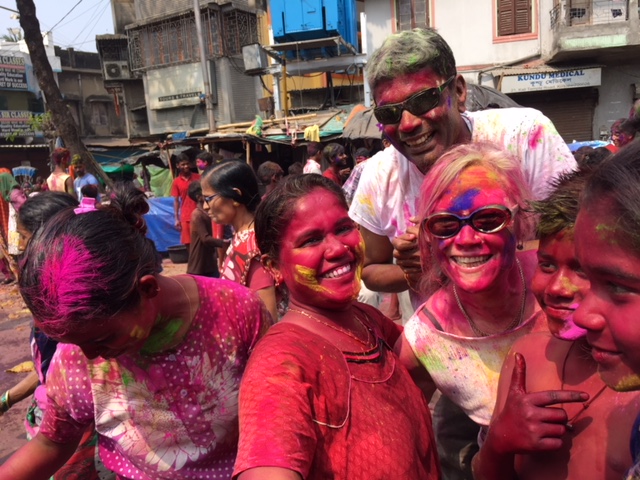3 am in Dubai feels like rush hour. All the worlds’ times are bumping up against each other and exploding outwards to every conceivable corner.
The holding room for the Mumbai flight is packed but weirdly quiet. It could be the hour, could be the phones in hands or could be me trying to work out whether I am about to wake up or go to sleep. Being a citizen of the world is hard work. I need more practice. Especially for this 26 hour flight Cape Town via Dubai and Mumbai, to Kolkata.
***
Coming in from Kolkata airport you are instantly reminded why the city keeps calling anyone who has visited back again. It is a parallel universe, somehow unlike any other with a chaos factor right off the gauge.
My e-hail driver is simultaneously on the phone and narrowly missing what seem to be at least fifty certain collisions, with busses, overloaded mopeds, yellow taxis, tuk tuks, pedestrians, dogs and crazy swooping crows. The sun is an orange ball dipping down towards two tall thin buildings that look lost in a low-slung mix of pollution and white cloud. The hooters are incessantly keeping time as we bob and weave into the city.
***
At the Hawrah bridge over the Ganges river the sun has just dropped and there is a long line of men in orange kurtas swinging lights over and around their heads. A crowd has gathered to watch what is some sort of religious ceremony with music, lights and a climactic kaleidoscopic spray of confetti. Six of the mentors who are here at DocEdge, Kolkata’s documentary film lab, have taken the gap to walk the city. The lab is intense with all day sessions with 25 selected projects working with filmmakers from across South East Asia getting their ideas right for pitches to global broadcasters and funds who fly in to try find the next big Asian documentary hit. Getting out into the city flushes away the day and most of us mentors are pretty wide-eyed as the lights spin and the music spirals into the heavens above the sacred river Ganga.

***
You can’t visit Kolkata without eating bhekti paturi, a fish covered in green mustard paste and wrapped in a banana leaf and steamed. Like all Bengali food, it is different, subtle, both delicate and spicy at the same time. Eat it with Bengali puri, dhal , and maybe roasted cauliflower with turmeric. Everywhere you go in the city there is food. On the pavements, down passages, over open fires, through holes in the walls and always an endless array of sweets behind glass. It would not be unreasonable to just visit Kolkata and plan each day around the next meal.

***
Looking for one of Kolkata’s better or lesser-known tea shops is not as simple as one might imagine. Especially if you happen to be following the whims of one of the UK’s better or lesser-known documentary filmmakers, Sean McAllister. Back in the day Sean was drinking everyone under the table and was rumoured to have staggered away from many an unfamiliar bed in unidentified cities across the world. But that is another story. Today, in Kolkata, in the present tense, the teetotaler Sean wants to find a famous tea shop. Why? Because it popped up on his map app and despite the fact that we are in a great neighbourhood near Hindustan Park Road with shops and cafes of all description perfect for visitors but not on the tourist main drag, but this does not seem to be doing the trick.
We head off down the busiest road in miles. It is long and straight and hot and unforgiving but McAllister has his reasons why. He isn’t even distracted after ducking into a sweet-meat shop and trying an impossible amount of every shape and colour on offer.
The McAllister map takes us over a four lane bridge. On the other side the map says we are close but the inexhaustible documentarian is walking left, then right, then north and south staring at his phone. None of the local store holders have heard of this reputably famous tea shop. Eventually, by chance, we are near the entrance to a market or mela that sells textiles and crafts from all of India’s regions and as we turn the corner the coin drops for McAllister. He has taken us on his private urban crusading route-march only to arrive at exactly the same place we visited the day before where we stood outside Dolly’s Tea Shop but did not think we should drink the tea. This time we did. First flush Darjeeling black tea. Almost worth the trek.
***
On the last night of DocEdge, after awards and dinner there is a plan to go to a bar on the other side of town. No one is sure who suggested this bar. But a crowd of us, filmmakers and mentors are all piling into cars and talking noisily as we slice through the night to the appointed venue.
We are offloaded at an intersection that shows no promise. On the left it looks like a construction site but there is a passage behind a barrier. A dark passage. One of the visiting panelists mutters that she is now officially out of her comfort zone which is not unexpected as you do have to step carefully over a few sleeping dogs and up some uneven steps past a completely exposed electricity connection board.
Down a longer passage on the first floor is a window into what looks like a period bar from a nineteen fifties movie with ceiling fans and tables dotted reassuringly around the room. But this is only for men, so we are guided into a darker back-room with long tables and plastic chairs. But nothing really matters tonight. Everyone is high on the energy of an inspiring week of discussions, viewings, disagreements, resolutions and all-round feisty engagement. Drinks are ordered, big bottles of Kingfisher Premium beer and from one of the filmmakers I had the good fortune to be assigned to who was amused to hear that I had an interest in Indian single malts, there was a staunch double of what was definitely not a single malt, maybe a blend and more than likely a whisky called, Black Dog. It lived up to its name. There was much singing of Bengali and Hindi songs. There were loud Malaysian toasts and a great many stories about varieties of life you won’t find in your hometown local. We left when the lights went out. It was still dark outside.

***



